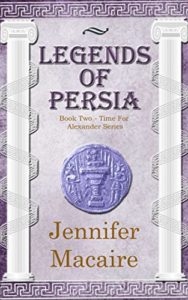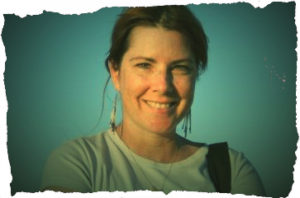
When Ashley Riveraine jumped at the chance to travel back in time to meet her hero Alexander the Great, she never thought she would end up staying there…
Following Alexander the Great’s army on its journey across Persia, Ashley is walking the knife edge of history. As a presumed goddess, Ashley is expected to bless crops, make sure battles are won and somehow keep herself out of the history books.
Can Ashley avoid the wrath of the Time Institute while keeping the man she loves alive?
*Keep scrolling down for a sneak peek*

Alexander was never cold. He thought I was strange, covering up in so many layers of wool and silk. I thought he was crazy, walking around half naked. The Macedonians, tough mountain people, were resistant to cold and wet. They strode through the snow barefoot, or as a slight concession wore sandals. The boots had worn out after only a couple of weeks, yet they had continued to put them on long after the soles had fallen off. To make me feel better, they said. The Greeks were used to warmer weather. They huddled in their cloaks and wore boots and mittens. Most of them thought that the Macedonians, besides being barbarians, had some loose screws. The folk the Macedonians referred to as “barbarians” were Artabazus’s tribesmen from the Zagros Mountains. They were a massive group, usually tawny or redhaired, with blue or green eyes, and standing roughly seven feet tall. They were impervious to cold, or heat, or just about anything. They even survived the crazy football games Alexander organized in the snowy fields of Samarkand.
The games became a fixture that winter. A goat, hollowed out and stuffed with enough straw to make it resemble a football (well, in your nightmares maybe), was carried from one end of the field to the other. And there were roughly fifty people in the way who wanted to take it from you and run in the opposite direction. And you could never be quite sure who was playing on your team. The teams seemed variable things; one played for one team and then when the mood struck, one changed sides. There were no uniforms; if anyone tried to wear anything it was ripped off within seconds. So approximately eighty naked men and a stuffed goatskin hashed it out on a large, flat, snow covered field.
The snow was soon cleared away, and the farmer lucky enough to own the field didn’t have to worry about plowing or fertilizer for the next season. Enough blood and guts were spilled to insure a heavy crop. The villagers and the soldiers not playing lined the field and cheered. Sometimes the players spilled over into the spectators, and sometimes it was the other way around. There were people standing, sitting, eating picnic lunches, sitting in trees or on walls, and riding horses up and down the sidelines to watch. After the game, there was a big barbecue nearby. Goats and cows were grilled, and everyone ate, drank, and insulted the losers. The losers usually drank the most, bled the most, and made the most noise when they were drunk.
Usse spent hours binding, splinting and fixing up the players. He shook his head. “They get more wounds from goatball than against the opposing forces,” he told Alexander.
“Well, they keep out of trouble,” he answered, picking up a handful of snow and eating it.
I picked up some snow, too, and carefully fashioned it into a snowball. He caught me watching him, and I tried to look innocent.
“What’s behind your back?” he asked me.
“Nothing,” I said, smiling sweetly.
“Let me see?”
Well, he asked for it. Afterwards, he held me down in the snow and stuffed handfuls of it down my back. I thought that was horribly unfair and told him he was a brute.
Then we went to see what the fuss was about on the playing field. Alexander was considered an unofficial referee. Whenever there was a discussion (i.e., a huge, bloody fight), he would be called on to mediate.
This time, we arrived to find a large heap of Macedonians sitting on a small pile of Egyptians with several Greeks thrown in. The barbarians had taken the goatskin and were fighting among themselves; a lone, slightly mad Spartan was in the middle of that fray. The Bactrians and Madrians, still new to the army, were trotting around the fringes of the fight, unsure of whom they were going to help at this point, and the Persians, who prided themselves on just about everything, were jumping up and down screaming that nothing was going right. I remarked to Alexander that this was a fairly typical epitome of his army, and he nodded thoughtfully.
The players were separated, the wounded sent to the infirmary, one on a stretcher. Alexander listened as they all shouted at him at once, the words most used being, “they cheated,” and “it wasn’t fair”. After pretending to listen for five or six minutes, Alexander tilted his head to one side and in a very wise voice asked, “Who has the ball?”
There was a brief silence as everyone looked down at their hands, checked out his neighbor, then saw that the barbarians had crossed the line and were piled up on the far side of the field having a great fight over who should carry the ball back to the middle to start again. Faint cries of “you did it last time” and “it’s my turn now” floated over the frosty air.
“I rule that they won,” said Alexander, pointing towards the barbarians, “and the game is over for today.” He held up his hands to forestall any groans. “Everyone is invited to eat ox tonight. I shall provide the wine!”
“Hurrah for Iskander, Oh, Mighty King!” bellowed all the players, and they rushed off to wash for dinner. Except for the Spartan, face down and unconscious on the field.
Alexander and I linked arms and strolled through the crowd. The townspeople were in awe of him, and they stood back a respectful distance. The sun was going down, in a few hours the oxen would be cooked, and fragrant smoke from cooking fires tickled my nose. Someone offered us a cup of hard cider. It was steaming hot, spiced with cinnamon and sweetened with honey.
We thanked the man, whom I vaguely recognized as one of the cooks working in the army. Alexander knew his name, though, and the man turned bright red with pleasure when Alexander handed the cup back to him saying, “My thanks, Khrysbaz, your cider is better than any I’ve ever had.”
The hot drink had warmed my belly. I leaned my head on Alexander’s shoulder. “What are you thinking about?” I asked him, hearing a large sigh.
“Barsine. I’m worried. It was the sports that put her to mind. She always was one for organizing games.” He shook his head ruefully. “She alone nearly wiped out half my army when we camped near Persepolis.”
I smiled, remembering the very large, redhaired princess throwing her javelin straight through Plexis’s tent one afternoon. Plexis had been standing behind her. She’d done it on a dare. She’d also done it to drive home a point. She was telling Plexis to stay away from her husband. Plexis had turned a rather sickly shade of green and had gone to sit beneath a fig tree for a while.
Alexander turned to me and cupped my face in his hands. “Why is it you aren’t jealous of my other wives?” he asked me.
“Because I am the one with you,” I answered. “I would be jealous of anyone who took you away from me. Why ask me that now?”
He looked over my head towards the far mountains. “I don’t know. I was wondering, that’s all. I’m terribly jealous. I would kill anyone who tried to take you away from me.”
“Don’t say that,” I said, strangely affected by his words. “We love each other. For me, that’s all that matters.”
He brushed his thumbs across my lips. “I think that’s why I can’t do without you,” he said. “You don’t care about my conquests, my kingdom, or my power. You care about me, only about me. If I were a beggar you would still feel the same about me.”
“Because you would still be yourself,” I said gravely. “In your case, it’s not the crown that makes the man. You wouldn’t change if you were a king, or if you were a beggar. You are completely Alexander, no matter what.”
He kissed me, bringing a rush of heat to my belly. “I am Alexander, no matter what,” he agreed, and he laughed.
The people around us turned at his laughter and smiled. He had a contagious, rich laugh, that overflowed like a child’s. I saw wonder in many faces. Alexander tossed his purple cape jauntily over my shoulders, covering us both in its purple swathe. “I want to ravish you here, in front of everyone, as we did at the ceremony of the fields.” He felt me stiffen and laughed louder. “You’re as pink as a carnation! Just look at you blush!” And he leaned closer and whispered a few things that turned my cheeks absolutely crimson.
We barely made it into the tent, and Axiom just had time to clear out before Alexander had my winter clothes strewn all over the floor.
“What’s this?” he’d cry, as another layer was uncovered. “You have more protection than my cavalry! What? Another shift? By the gods, woman, it’s like peeling an onion!”
After making love, we lay in a comfortable tangle on his bed. I was warm; Alexander’s body radiated more heat than the brazier standing nearby. Outside, the snow had begun to fall again. The farmers were overjoyed. To them, snow was a precious gift from the gods, and hardly a day went by that I didn’t find a present of some sort left outside the tent. The people still thought I had something to do with the harvest goddess. Not that I minded. I loved finding a small wicker basket full of crisp red apples, with a light layer of snow like frosting on them, or a jug of hard cider, or a knit shawl.

Author Jennifer Macaire lives in France with her husband and three children. She lived in the Virgin Islands and used to work as a model. She met her husband at the polo club where he was playing. All that is true, but she mostly likes to make up stories.
She has published over twenty novels.
Her short stories have been published by Three Rivers Press, Nothing But Red, The Bear Deluxe, and The Vestal Review, among others. One of her short stories was nominated for the Push Cart Prize (Honey on Your Skin) and is now being made into a film. Her short story ‘There be Gheckos’ won the Harper Collins /3 AM flash fiction prize.
